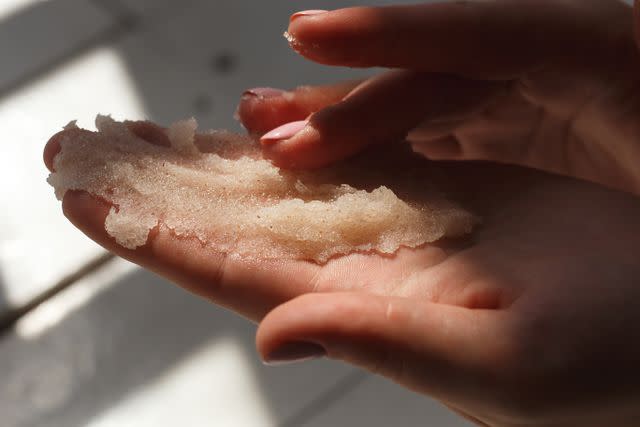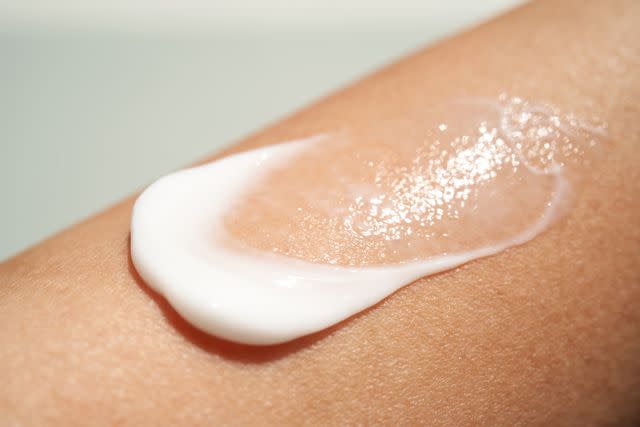How to Curate a Body Skin-Care Routine, According to the Experts

Getty Images
When it comes to receiving its fair share of TLC, the skin on the body is often overlooked.
“There has long been a strong focus on facial skin care because it’s more vulnerable and always on display,” says Deanne Mraz-Robinson, MD, co-founder of Modern Dermatology in Westport, Connecticut, and assistant professor of dermatology at Yale School of Medicine. However, this sometimes leads to neglecting the skin elsewhere on the body.”
Celebrity esthetician Shani Darden, who is responsible for getting many celebrities red-carpet and screen-ready (think Jessica Alba and Chrissy Teigen), stressed the importance of prioritizing the skin on the body as much as the face. “A body-centric skin-care routine is crucial for maintaining overall skin health, addressing specific concerns, and preventing issues like dryness and premature aging,” she notes.
What’s more is that according to Ariel Ostad, MD, a dermatologist and cosmetic surgeon in New York City with his namesake private practice, how complex treating the skin on the body can be because various parts all have different needs and concerns with a lot more surface area to cover than the face. “For example, the skin on the face is more delicate and sensitive compared to the skin on the body. Therefore, areas like the elbows, knees, and heels may need extra hydration and exfoliation due to thicker skin and increased dryness,” he says. Then factor in sun damage and pigmentation concerns, acne, KP issues, and more, and it’s apparent that curating a body skincare regimen is essential.
Dr. Mraz-Robinson points out that now there are options well beyond basic cleansers and creams. Plus, the number and quality of skin-care products meant for the body contain the same actives and science-backed ingredients as facial products. So, there is zero excuse for skimping on an effective and result-driven body skin-care routine. Read on to understand the key steps, ingredients, and product recommendations for a pro-approved body skin-care routine so you can transform the skin on your body now and in the future.
Cleanse
It’s doubtful that we need to explain the benefits of cleansing your body, but it's definitely worth elaborating on in the spirit of body care 101. “Cleansing removes dirt, oil, sweat, bacteria, and pollutants that accumulate on the skin throughout the day,” explains Dr. Ostad. But it also has a higher beauty purpose. “When skin is clean, it allows for better absorption of skin-care products and creates a clean canvas for moisturizers, plus it also helps prevent clogged pores and breakouts,” he adds. Spend extra time sudsing up underarms, feet, and the groin, all areas that contain the most amount of sweat glands and tend to be prone to bacteria and odor.
“Just like you would for a facial cleanser, look for one that is tailored to your skin’s needs. For example, if you work out a lot and suffer from acne on the body, you might want a cleanser with antimicrobial properties,” says Dr. Mraz-Robinson. (Look for ingredients like salicylic acid or glycolic acid on the label.) “On the flipside if your skin is prone to dryness, look for humectants which draw water into skin and emollients that seal them in; and if your skin is sensitive, avoid fragrances,” she notes.
Exfoliate

Getty Images
Although your standard skin-care routine likely has a range of exfoliants, such as a glycolic pad or a creamy AHA mask, your body probably barely gets more than a random, soupy scrub in the shower every few weeks. However, experts say that exfoliation in your body skin-care routine should be a priority. “Just like the face, it’s important to regularly exfoliate the skin on the body to shed dead skin cells and support the most effective absorption of products you apply following your shower,” says Dr. Mraz-Robinson, who recommends exfoliating one to three times a week. She says you can choose the method that works best for your body, such as a physical exfoliator, like dry-brushing or rice powder scrub, a chemical exfoliant, like an AHA or glycolic acid body wash, or even a pro in-office body peel treatment every few weeks. “Regardless of the type of exfoliation you choose, be sure to protect your skin well from ultraviolet rays as exfoliation may make it more vulnerable to damage,” says Dr. Mraz-Robinson.
Darden, founder of her namesake skin-care line Shani Darden Skin Care, points out that you should decrease exfoliation to once to twice a week if you have dry skin. “Personally, I only exfoliate in the shower twice a week because I have dry skin,” she says. “I use a body brush in the shower along with body cleansers to gently exfoliate.” Dr. Ostad suggests concentrating on areas that need the most help to reveal softer, smoother skin and remove dead skin cells lingering on the surface of the skin in areas like the elbows, knees, and heels. Marina Peredo, MD, a dermatologist and founder of her private practice, Skinfluence, in New York City, prefers a retinol and antioxidant-laced body moisturizer post-shower, especially if sun damage and uneven skin tone are a concern. “I like a retinol and green tea combination to minimize irritation and promote the power of antioxidants,” she explains.
Moisturize
ICYMI: Consider body cream to be the hero of your body skinc-care routine. Here’s why: “Moisturizing ingredients deliver supplemental hydration to the deeper layers of the skin, plus strengthen the skin barrier, protecting it from outside irritants and helping it to lock in and regulate hydration levels,” says Dr. Mraz-Robinson. But not all are created equal. Scan the label for proven hydrators such as “humectants that draw moisture into the skin, like hyaluronic acid and glycerin, as well as emollients that soften and soothe the skin, such as shea butter, oils, lipids, and ceramides,” she adds. Dr. Mraz-Robinson says that if your skin is on the dry side, weave a hydrating session into your a.m. and p.m. skin-care routine, but for normal skin types, choose just one. However, Peredo recommends working on this essential step in the morning and night for optimal results.
Dr. Ostad calls out additional proven powerhouse ingredients, including niacinamide, a vitamin B derivative, and vitamin C, both of which can help bolster the skin’s barrier and help even out skin tone. Hyaluronic acid (a skin-care VIP because it attracts and binds to water in the superficial layers of skin) and ceramides, which help seal moisture in and prevent it from evaporating, are also included.
Sun Care

Getty Images
UV rays are a key factor in skin aging. That’s because ultraviolet light leads to collagen degradation, as well as a long list of other negative effects, including uneven skin tone, fine lines, skin laxity, potential cellular degradation, and skin cancer. Needless to say, daily sunscreen on the body (just like the face) is a non-negotiable step in every body skin-care routine.
“UVA rays are the wavelength attributed to the advanced signs of aging, while UVB rays cause sunburns and skin cancer,” says Dr. Mraz-Robinson. “Sun protection also prevents hyperpigmentation, sun spots, and melasma.” Sure, you may reach for a body sunscreen when you hit the beach, go on vacation, or know you’ll be outside for a long period of time, but it’s the incidental exposure that your body is bombarded with day in and day out that will wreak the most havoc. Opt for a broad spectrum physical (aka mineral-based) SPF 30 or higher with the actives titanium and zinc oxide and use an SPF 50 or above if you’ll be out in the sun for a long amount of time,” Dr. Mraz-Robinson says.
Frequently Asked Questions
What are common mistakes when it comes to body skin care?
According to Dr. Mraz-Robinson, overdoing exfoliation is a common mishap she sees with her patients. “There is no need to scrub with force or lather up more than one time a day, and doing so can overly strip skin of its natural oils, leaving it dehydrated and the barrier compromised,” she says. Next is not staying on top of having super clean loofahs or cleansing body brushes. “You have to replace and clean them regularly because oftentimes they harbor the growth of bacteria and fungus and can cause infection on the skin,” she adds.
For Darden, “forgetting to put on SPF every day is the biggest mistake people make for both their face and body,” she says. “Most people don’t realize it, but you still need sunscreen even if you’re sitting inside of an office all day because of UV exposure through windows, as well as overhead light.”
How does the skin on the body age compared to face?
Peredo points out that the skin on the body is very different from the skin on the face and that different parts of the body age differently, too. “Think about the neck — it has the thinnest skin on your body, along with your eyelids,” she says. “Plus, [these areas are] devoid of oil and, therefore, are the first to get thin, crepey, and age the fastest.” She also explains that the skin on the arms, chest, and kneecaps come in next for areas that need moisturizing attention. “But you’re not going to use the same cream on your eyelids that you do on your feet!” she says.
Should a body skin-care routine change from morning to night?
Although there are plenty of a.m. body skin-care steps to incorporate into your daytime routine, Darden does say that for some body-centric treatments, p.m. application could be more beneficial. “Nighttime is all about your skin repairing itself while you sleep,” she says. So, if you want to use a body treatment for acne or hyperpigmentation, nighttime is the best."
When should a body skincare routine be changed?
Peredo explains that you may need to change up your body skincare routine based on the weather and how it affects the skin on your body. “Winter months in cold climates are brutal on even the thicker skin on your body, then add on long hot showers that typically come with it and you’re creating a breeding ground for dry, flakey skin,” she says. Another reason you may need to swap up your go-tos: weight loss. “So many patients are using semaglutide and their weight loss can be brutal on their skin,” she explains. “Rapid weight loss doesn’t give your skin a chance to catch up—the fat is gone so there’s nothing supporting the skin and can result in flappy arms and thighs.”
For more InStyle news, make sure to sign up for our newsletter!
Read the original article on InStyle.

 Yahoo Lifestyle
Yahoo Lifestyle 
